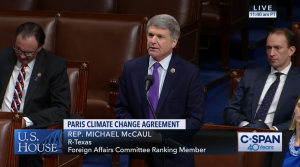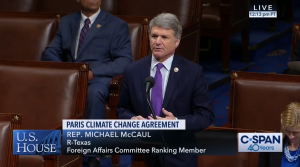ICYMI: McCaul on House Floor to Oppose Democrats’ Bill Putting U.S. Security, Economic Interests at Risk
Washington D.C. – This week, House Foreign Affairs Lead Republican Michael McCaul (R-TX) took to the House floor to oppose H.R. 9, a bill that would result in a catastrophic downturn for U.S. economic and innovation interests, cost millions of jobs and put the U.S. at a disadvantage amongst global competitors. The Climate Action Now Act would bind the U.S. to the irresponsible and expensive Paris Agreement, a pledge intended to cut greenhouse gas emissions that was unilaterally adopted by President Obama without Congressional consent, stakeholder input, or cost-benefit analysis. This agreement would do little to reduce emissions putting other countries such as China, the world’s largest emitter of greenhouse gases, on an unfair playing field in comparison to the U.S. Key highlights below:
On the dangerous history of the Paris Agreement’s adoption without Congressional input or ratification:
For full remarks as delivered, click on the photo above or here.
“We can all agree the climate is changing and we need to take positive steps to address it. However, I oppose H.R. 9 because it is just a messaging bill that is dead on arrival in the Senate and that the President will veto.
“I oppose H.R. 9 because, among other problems, it attempts to codify President Obama’s unrealistic and unilaterally determined greenhouse gas reduction pledge under the Paris Agreement.
“This pledge was submitted on behalf of the United States without any notification, consultation, or role for Congress.
“At a recent hearing, when asked whether any of the witnesses agreed that President Obama should have submitted the Paris Agreement to the Senate for ratification, all four witnesses – including the three Democratic witnesses – agreed it should have been submitted to the Senate for ratification.”
On President Obama’s negligence in seeking outside stakeholder input or cost-benefit analysis:
For full remarks as delivered, click on the photo above or here.
“In addition to not involving Congress, the Obama Administration also did not seek meaningful input from private sector stakeholders, such as energy companies.
“Not only that, but the Administration provided no cost-benefit analysis or economic justification to rationalize its pledge, its arbitrary pledge, to cut greenhouse gases by 26-28% below 2005 levels by 2025.
“A recent study by the Chamber of Commerce estimates that it would cost U.S. GDP $250 billion and 2.7 million jobs by 2025; and by 2040 could cost the United States economy $3 trillion and 6.5 million industrial sector jobs.”
On putting the U.S. at an unfair disadvantage amid global security and economic competitors:

For full remarks as delivered, click on the photo above or here.
“Over the last decade, U.S. greenhouse gas emissions have decreased by 14 percent while China’s emissions doubled.
“Sadly, China – the world’s largest greenhouse gas emitter, under this agreement – will continue to increase its emissions through 2030 under its unenforceable Paris Agreement pledge. Other major greenhouse gas emitters, like Russia, have signed the Paris Agreement but not ratified it, which makes their pledges meaningless.
“Instead of doubling down on a pledge that Congress had no role in setting, that will have a potentially catastrophic impact on the U.S. economy, and which will do nothing to address China and other countries’ growing emissions, we should work on bipartisan legislation to boost research, advance technologies, promote innovation, and develop real solutions.”
On Republicans working across the aisle to find solutions to reduce greenhouse gas emissions while promoting U.S. economic interests and innovation:
For full remarks as delivered, click on the photo above or here.
“There are many of us on this side of the aisle that agree, the climate is changing, and I think it’s a question of how we get there and the solutions and innovation and technology. I hope — it will not move forward. it will obviously be vetoed. Maybe we can work together in a bipartisan way on something that can reduce emissions using innovation, technology, and I personally think nuclear power should be examined as well.”
###
